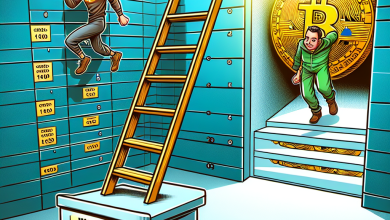Offers for bargain hunters: Secure interest rates plus flexibility: Is it worth it to save for growth again?
The interest rate race is in full swing. First, the neobrokers Trade Republic and Scalable pushed ahead and offered 2.1 and 2.3 percent interest on uninvested capital, respectively. Then the direct bank ING followed suit. There, both new and existing customers now get three percent on the daily allowance for six months. The Volkswagen Bank couldn’t let that sit: it is now offering new customers a little bit more for six months, namely 3.1 percent for deposits of up to 100,000 euros. After the six months, however, the interest rate falls significantly – at ING to 0.6 percent, at Volkswagen Bank to 0.65 percent.
So savers can earn something again with overnight money – especially if they use temporary lock offers. The only question is: for how much longer? The interest rates for overnight money are based, among other things, on how much interest commercial banks receive, which in turn park money at the European Central Bank (ECB). That’s three percent at the moment. This interest rate could fall if the ECB eased monetary policy again – and overnight interest rates would fall with it.
This development is not improbable: the US Federal Reserve has indicated that the turnaround in interest rates in the USA could soon come to an end due to the banking crisis and fears of a recession. The ECB is lagging behind the Fed somewhat in terms of timing. However, it could also turn around again in the not too distant future.
How far will the banks go?
So the race for the most attractive call money rates could be over as quickly as it started. In the medium term, however, further competitive offers from banks are possible. This speaks against choosing a fixed instead of an overnight allowance. With a fixed deposit account, savers have a longer-term interest rate guarantee. But they are not that flexible. In this mixed situation, a special interest product could celebrate its comeback: growth savings, also called growth savings.
It works like this: savers invest a fixed sum for a certain period of time, for example a few thousand euros for three years. Co-payments are usually not possible. Savers collect interest from the first year – and this increases over time. At the Frankfurter Volksbank, for example, there is currently 1.75 percent interest for sums from 5,000 euros in the first year, 2.1 percent in the second year, and 3.0 percent in the third and last year. After 15 months, customers can cancel with three months’ notice.
Many savings banks and cooperative banks offer growth savings. Occasionally there are also such offers from housing cooperatives that maintain savings facilities for their members. The conditions differ, from the minimum deposit to the maximum term to the interest rate. The blocking period for terminations also varies. Some banks charge prepayment interest after the blocking period if money leaves the account before the end of the term.
Incremental savings should not be confused with premium savings: regular savings payments are made, which after a certain period of time result in a bonus in addition to a variable basic interest rate. In the case of accrual savings, on the other hand, the investment sum and interest scale are fixed in advance. There have recently been a number of judgments about incorrect interest calculations relating to premium savings.
Bet on the development of interest rates
With incremental savings, savers do not get the highest currently possible interest rate, at least not at the beginning. But: you secure relatively high interest rates in the medium term – and, unlike with a longer-term fixed-term deposit account, you remain flexible, at least in the medium term. This can be interesting at a time when the direction in which interest rates are going is completely unclear. According to the law, you can also terminate a fixed-term deposit prematurely “for good cause”. However, it is doubtful whether banks will accept that there are higher interest rates elsewhere as an important reason.
If you want to put money aside for a few years, expect interest rates to fall, but want to remain flexible (and don’t feel like interest rate hopping) – accumulative savings can be an option for you. However, it is important to compare offers carefully.
At the PSD Bank Munich, for example, the interest rate for growth savings is staggered over four years and ranges from 1.5 percent per year to a lower (!) one percent in the second and third year and up to 1.5 percent again in the fourth year. The minimum investment is 1,500 euros, and the notice period is only nine months. Nevertheless: not a particularly attractive offer. Not so at the Volks- und Raiffeisenbank Bonn Rhein-Sieg: Savers can park there from 5,000 euros upwards, for one percent interest in the first year, 1.5 percent in the second and 3.0 percent in the third year. Much better. However, the money is tied up here for at least twelve months.
At the Kreissparkasse Kusel, there is an interest rate of up to 3.95 percent from a deposit of 500 euros, staggered over five years. In the first year flow 1.2 percent. The Sparkasse’s advertising says something aunt-like: “Treat yourself to something nice with your savings.” How much savers can treat themselves also depends on whether savings banks and cooperative banks join the interest rate arms race. So far, they’ve been remarkably reticent. If competition picks up in this part of the market too, incremental saving could finally be on the verge of a comeback.
Also read: Should I Park Cash in Money Market Funds?






